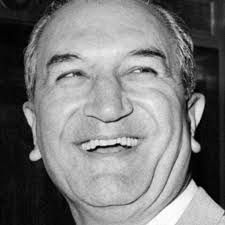Joe Bonanno, Sr. was a self-described “venture capitalist” and denied any involvement with drug trafficking or prostitution. As the head of one of New York City’s five original mafia families, Bonanno led the Brooklyn-based crime family for more than three decades before losing power in the 1960s.
Bonanno was born Giuseppe Carlo Bonanno on January 18, 1905 in Castellammare del Golfo, Sicily. At age three, his family moved to the United States and settled in the Williamsburg neighborhood in Brooklyn for approximately 10 years before returning to Italy. Bonanno slipped back into the United States in 1924 by stowing away on a Cuban fishing boat bound for Tampa.
Bonanno is said to have become involved in bootlegging activities, and soon joined a Mafia family led by Castellammarese, Salvatore Maranzano.
Bonanno became known to Joe “the Boss” Masseria, the leader of Mafia activities in New York. In 1927 violence broke out between the two rival factions, Masseria and Maranzano, in what would become known as the Castellammarese War. It continued for more than four years. By 1930, Bonanno became one of Maranzano’s chief aides and served as an underboss and chief of staff.
By 1931, momentum had shifted to Maranzano and the Castellammarese faction. They were said to be better organized and more unified than Masseria’s group. Lucky Luciano and Vito Genovese urged Masseria to make peace with Maranzano, but Masseria refused. Luciano and Genovese concluded a secret deal with Maranzano that involved the return for safety and equal status for Luciano in Maranzano’s new organization. Luciano and Genovese murdered Masseria, which brought an end to the Castellammarese War.
Bonanno would go on to be awarded most of Maranzano’s crime family. At age 26, Joe Bonanno had become one of the youngest-ever bosses of a crime family. Years later, Bonanno wrote in his autobiography that he had not known about the plan to kill Maranzano.
Bonanno was nicknamed “Joe Bananas,” a name he reportedly despised and his family was sometimes called “the Bananas family.” The Bonanno crime family’s underbosses were Frank Garofalo and John Bonventre. While it was known as one of the smaller crime families, it was said to be more tight-knit than others. The Bonanno family prospered in the business of loan sharking, bookmaking, numbers running, prostitution, and other illegal activities. Bonanno was married to Fay Labruzzo and they had three children- Salvatore “Bill” Bonanno, born 1932; Catherine, born 1934; and Joseph Charles Jr., born 1945. In 1938, Bonanno left the country, then re-entered legally at Detroit so that he could apply for citizenship.
Bonanno’s invested in real estate during the Great Depression. His legitimate business interests included three coat factories, a laundry, cheese factories, funeral homes, and a trucking company. When Bonanno became a U.S. citizen in 1945, he was said to be a multi-millionaire.
Unlike many mafia counterparts, Bonanno was never convicted of anything more serious than obstructing justice. Bonanno was convicted in 1980 for trying to block a federal grand jury investigation into his sons. Bonanno served nearly eight months in prison before being paroled in July 1984. He had also served 14 months in prison in 1985-86 for contempt of court for refusal to answer questions about other crime family leaders.
Joe Bonanno became increasingly unpopular with other Mafia bosses. It was reported that Magaddino was incensed that Bonanno was moving in on Toronto, long considered part of the Buffalo family’s territory. Some thought he spent too much time away from New York, and more in Canada and Tucson, Arizona, where he had business interests. Bonanno eventually was removed him from power and replaced with one of his capos, Gaspar DiGregorio. This resulted in Bonanno’s family breaking into two groups, the one led by DiGregorio, and the other headed by Bonanno and his son, Salvatore. This would come to be known as “The Banana Split.”

In October 1964, Bonanno disappeared and was not heard from again for two years. Bonanno later would claim that he was kidnapped in front of his lawyer’s apartment at 36 East 37th Street in New York City by Buffalo Family members, Peter Magaddino and Antonino Magaddino and was held captive in upstate New York by his cousin, Stefano Magaddino. After six weeks, Bonanno was released and allowed to go to Texas. Bonanno’s claims were regarded as lore, as it was unlikely he would have been walking the streets of New York City unguarded. FBI recordings of New Jersey boss Sam “the Plumber” Decavalcante revealed that the other bosses were taken by surprise when Bonanno disappeared.
Bonanno suffered a heart attack in 1968 and announced his retirement. He resolved never to get involved with New York Mafia affairs again. Bonanno resigned to a quiet life in Tuscon. His notoriety was briefly revived in January 1995 when his family held a much-publicized 90th birthday party for Bonanno at a resort in Tucson. Among the 300 guests were priests, politicians, actors, attorneys, authors and family members.
Bonanno would spend his remaining years under the close watch of the F.B.I. Bonanno died of heart failure at the age of 97 at a hospital in the city where he had retired in 1968.
In his autobiography titled, “A Man of Honor, the Autobiography of Joseph Bonanno,” he wrote that the term Mafia, “refers to a process, a special set of relationships among men. I stay away from the term because it creates more confusion than it is worth.”
